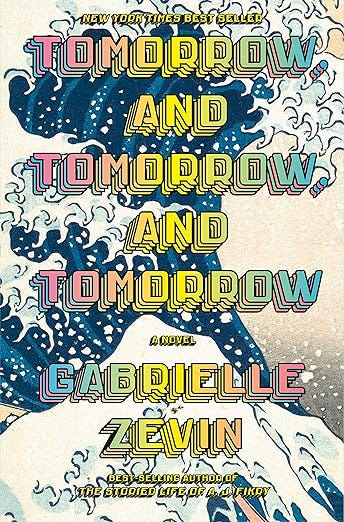When your ideas outstrip your skills, do this - Gabrielle Zevin (#55)
A best-selling author's advice for anyone creating anything
There is a time for any fledgling artist when one’s tastes exceeds one’s abilities.
Gabrielle Zevin
“The worst enemy to creativity,” the poet Sylvia Plath wrote, “is self-doubt.”
The problem is that often the first version—or several —of a creation isn’t very good. The creative process is iterative, and during that iteration, self-doubt creeps in.
What do you do during that period? When what you have in your head doesn’t reflect what comes out of it?
In her best-selling novel Tomorrow, and Tomorrow, and Tomorrow, Gabrielle Zevin offers a simple yet profound way of answering that question.
And it’s the subject of today’s OGT.
Sam and Sadie are friends from childhood who reunite in college.
Shortly after their reunion, they find out they’re both diehard gamers. Eventually, they decide to design and develop their own game together called Ichigo. Early on, the legwork turns out to be more than they’d anticipated.
A bromide1 about the creative process is that an artists first idea is usually the best one. Ichigo was not Sam and Sadie’s first idea. It was, perhaps, their thousandth.
It’s here that Zevin talks about what may be the key challenge to making anything—your skills haven’t caught up to your ideas. How do you reconcile that contradiction?
Zevin’s answer is the best one I know.
Herein, the difficulty. Sam and Sadie both knew what they liked in a game, and they could easily tell a good game from a bad game. For Sadie, that knowledge was not necessarily helpful. Her time with [her teacher] and her years studying games in general had made her critical of everything. She could tell you exactly what’s wrong with any game, but she didn’t necessarily know how to make a great game herself.
There is a time for any fledgling artists when one’s tastes exceeds one’s abilities. The only way to get through this period is to make things anyway.
The OGT
This reminds me of Seth Godin’s secret for coming up with good ideas:
More bad ideas. The more bad ideas the better. If you work really hard on coming up with bad ideas, sooner or later, some good ideas are going to slip through.
The way to quality is often quantity—quantity plus adjusting for feedback.
I try to remember that when I’m struggling through a project. That if my tastes are exceeding my abilities, there’s only one answer.
Keep working until my abilities catch up.
Bromide: “a trite and unoriginal idea or remark, typically intended to soothe or placate.”





